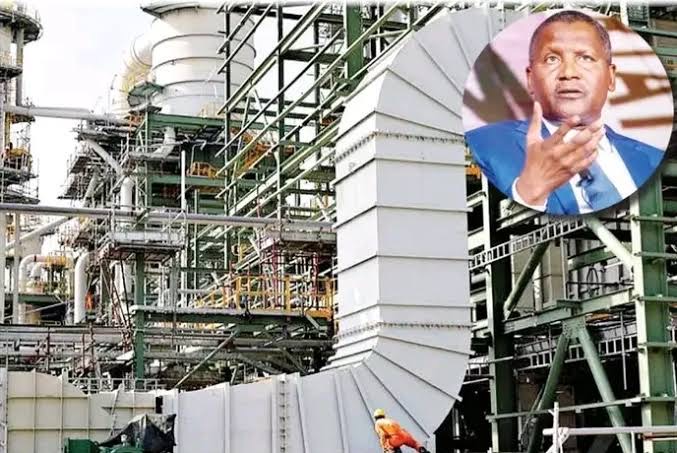The Governor of the Central Bank of Nigeria (CBN), Yemi Cardoso, recently expressed optimism regarding the impact of lifting refined petroleum products from the Dangote Refinery on Nigeria’s foreign exchange demand pressures and overall economic stability.
Speaking in Abuja on Tuesday during the presentation of a communiqué from the 297th Monetary Policy Committee (MPC) meeting, Mr. Cardoso highlighted the potential benefits of this development for the nation’s economy, particularly in terms of transportation costs and food prices.
Mr. Cardoso pointed out that transporting petroleum products from the Dangote Refinery would play a crucial role in reducing the pressure on Nigeria’s foreign exchange market, which has been exacerbated by the need to import refined petroleum products.

According to him, this move would not only help stabilize the exchange rate but would also have broader positive effects on the nation’s economic balance. “The committee expressed optimism that lifting refined petroleum products from Dangote Refinery will moderate transportation costs and significantly support the easing of food price pressures in the short to medium term,” said Cardoso.
By reducing transportation costs, which often contribute significantly to inflationary pressures, the move is expected to bring relief to Nigerian consumers. Food prices, which have been rising due to a combination of factors including transportation costs and energy price hikes, could see some easing.
“This is also expected to moderate foreign exchange demand for the importation of refined petroleum products, with a positive spillover on external reserves and improvement in the overall balance of payment position,” Mr. Cardoso elaborated, emphasizing the potential positive outcomes for Nigeria’s foreign reserves and overall economic balance.
Additionally, Mr. Cardoso shed light on the state of the Nigerian financial system, affirming its stability despite ongoing economic challenges. He reassured the public that Nigeria’s financial institutions remain resilient and well-managed, a sentiment shared by the members of the MPC.
“Members assessed the performance of key financial soundness indicators and noted with satisfaction that in spite of familiar headwinds, the banking industry remains safe, sound, and stable,” he stated.
However, the Central Bank Governor cautioned that while the financial system is currently stable, it is essential to maintain strong supervisory oversight to ensure that this stability continues. He stressed the importance of the banking sector’s role in supporting the broader economy and underlined the need for ongoing vigilance in overseeing the industry. “The committee, however, emphasized the need to sustain supervisory oversight on the industry to strengthen its continued support to the economy,” Mr. Cardoso added.
Turning to the issue of inflation, particularly food inflation, Mr. Cardoso identified several key risks that continue to pose challenges to the nation’s efforts to stabilize food prices. He cited factors such as flooding, which disrupts agricultural production, energy price hikes, fuel scarcity, and insecurity in farming communities as the primary drivers of rising food costs.

These issues, according to the CBN governor, are putting significant pressure on the consumer price index (CPI), which tracks the average change in prices paid by consumers for goods and services.
Given the weight that food prices hold within the CPI basket, the MPC took note of the federal government’s efforts to address insecurity, which has severely impacted agricultural production in certain regions.
Mr. Cardoso acknowledged the importance of these efforts, stating that addressing insecurity is crucial to stabilizing food supplies and ensuring food affordability for Nigerians. “Considering the weight of food in the consumer price index (CPI) basket, the MPC recognized the federal government’s efforts in addressing insecurity in farming communities,” he remarked.
In line with these efforts, the MPC also praised the federal government’s initiatives to reduce the food supply deficit by allowing duty-free imports of key food commodities. This policy aims to fill the gap created by domestic production challenges and ensure that Nigerian markets have adequate food supplies, thereby mitigating inflationary pressures.
Mr. Cardoso underscored the importance of remaining resolute in addressing food inflation and maintaining food security, particularly in light of the persistent risks posed by flooding, energy costs, and insecurity. “In addition, the MPC applauded the ongoing effort of the federal government to bridge the food supply deficit through the duty-free import window for food commodities,” he said.
In conclusion, the Central Bank Governor reaffirmed the CBN’s commitment to ensuring economic stability through sound monetary policies and by supporting federal government initiatives aimed at improving food security, stabilizing the financial sector, and addressing foreign exchange demand pressures.
With the Dangote Refinery playing a pivotal role in moderating the demand for imported petroleum products, the CBN remains hopeful that these measures will lead to improved economic conditions in the near future, benefiting both the banking sector and Nigerian consumers alike.

































